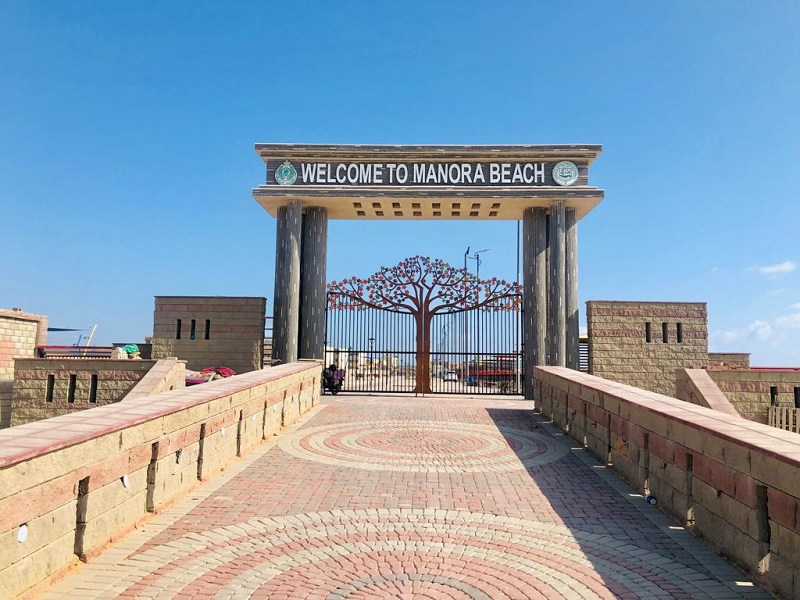Dream of Karachi Circular Railway revival inching towards reality
Tahir Siddiqui
October 17, 2021
A map highlighting the proposed route of the Karachi Circular Railway.
KARACHI: The scheme to restart the 44-km Karachi Circular Railway (KCR) by constructing three underpasses, a flyover and an elevated 6.4-km structure along with the laying of new rail tracks on most part of the route for running electric trains at a revised cost of over Rs207 billion still looks like a pipedream.
However, this highly ambitious plan, for which substantial ground work has already been done albeit on paper, may go a long way in transforming Karachi’s public transport problem.
There are many sceptics, including those in the Sindh government, who believe the federal government is still not sincere in reviving the KCR, which has remained off track for well over 20 years. However, those like the prime minister, who had inaugurated the project earlier this month, railways minister and some senior officials of Pakistan Railways are pretty confident that they will be able to complete this project in three years.
Initiated in 1964, the old KCR route started from Drigh Road and ended in downtown Karachi. After suffering losses for years, it ceased operations in 1999.
The service was initiated in 1964 and suspended in 1999
Infrastructure development
The Frontier Works Organisation (FWO) has to start construction of structures on the KCR route and an elevated 6.4-km structure for Rs11.508bn in two phases, against which the provincial government has to pay Rs6bn as its share.
However, no contract has so far been signed or work order issued to the FWO.
The main idea is to remove almost all the authorised and unauthorised level crossing at 22 different places. (See map).
KCR Project Director Ameer Daudpota told
Dawn that the project was primarily envisaged for the construction of structures for elimination of 22 level crossings from the KCR loop.
According to the PC-1 of the project, an underpass for road traffic would be constructed at Sehba Akhtar Road, Gulshan-i-Iqbal and the existing culvert at 13D area would be widened. An underpass will be built at Sharifabad, Federal B. Area and another at Mujahid Colony, Allama Rasheed Turabi Road. Besides, a flyover along Ahmed Shah Bukhari Road across KCR providing access to the congested neighbourhood along Mauripur Road and its link road.
The proposed structures would also provide conflict free movement of Green Line bus rapid transit system and road traffic along Nawab Siddiq Ali Khan Road, along Tabish Dehlvi Road near Abbasi Shaheed Hospital, Chotta Maidan and Bara Maidan, Nazimabad.
The PC-1 of the project said that no major shifting or protection was needed for the utilities and services due to the construction of proposed structured along the KCR right of way.
‘550,000 ridership’
Mr Daudpota said that the proposed structures were part of the infrastructure for the development, operation and maintenance of KCR as modern urban railway under the public private partnership (PPP) mode. “The proposed structures will be compatible with other components such as electric traction, signalling, telecom, etc, to avoid any clash with the design of other components, which may be executed by BOT [built operate and transfer] partner,” he added.
The project director said that eight trains, each comprising a locomotive and four coaches, would run with each train facilitating 814 passengers at a time.
“The entire 44km route will be covered in 55 minutes,” he said and added the ridership would be 550,000 passengers per day.
He said that rehabilitation of the existing track from Drigh Colony/Drigh Road to Karachi City station on loop section had been started and so far it had 50 per cent physical progress.
“The rehabilitation of a 14km track from City station to Orangi station has already been completed with two trains operating per day from February 10, 2021,” he added.
The project director said that existing set up of KCR had 44km length with 30km loop and 14km main line length.
He said that there would 24 railway stations — 10 on-ground and 14 elevated.
All the encroachments on and along the KCR route have been removed by the railway authorities with the assistance of the provincial authorities, police and Rangers.
“Most of the KCR track was encroached upon for the past 20 years”, Mr Daudpota said adding that no authority ever bothered to clear encroachments from the site until the Supreme Court ordered.
The 44km KCR track passes through different parts of the city where people have built shops, houses and other structures over the past many years
The displaced people will be rehabilitated by the provincial government.





